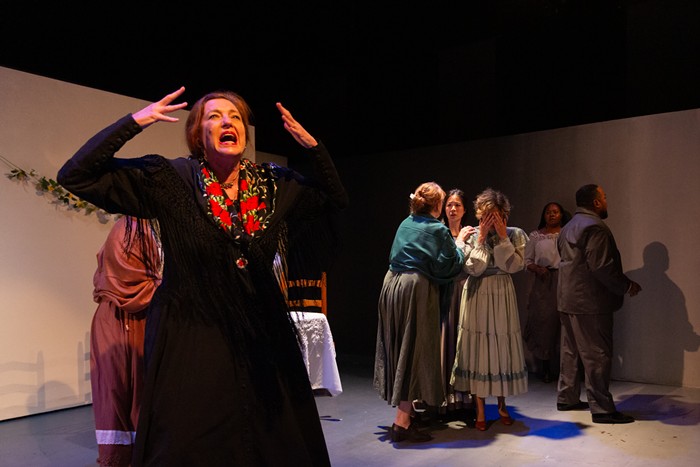The 1975 documentary Grey Gardens is a skin-crawlingly disturbing profile of mother and daughter "Big Edie" and "Little Edie" Beale, aunt and cousin to Jackie Kennedy, two old women of questionable sanity living together in a decaying, filthy, 28-room estate swarming with cats, raccoons, and fleas. The doc has been variously lauded as a cult classic and criticized as exploitative, and watching it feels queasily voyeuristic: On the one hand, it's easy to see why drag queens are drawn to dressing as Little Edie, an outrageous character prone to operatic proclamations and bizarre, homemade outfits. On the other? No matter how outrageous they are, it's really not fucking cool watching old ladies eat cat food, as the Beales were known to do when the money ran low.
Doug Wright, who also penned I Am My Own Wife, which ran at Portland Center Stage in 2006, wrote the musical adaptation of this campy, complicated mess. Wright's challenge was to render the Beales fit for Broadway—to contain both draggy charm and shocking devastation within the parameters of a two-hour play, without losing the audience altogether. By necessity, this adaptation hews to a romantic understanding of the Beales' life, one which frames their tragedy as that of strong-willed, creative women born in the wrong era, lashed together in a decaying estate by love, resentment, and the creeping knowledge that only in each other will they find the audience their frustrated ambitions require. (It is equally possible to frame their tragedy as that of two codependent old nutbags born too privileged to cope with even the most basic worldly requirements once the money ran out. That interpretation, however, would probably not have made it to Broadway.)
The musical is cleverly structured—the entire play is set in Grey Gardens, the Beales' house; Act One in 1941, Act Two in 1973. This gives us a glimpse of life before the fall, when Little Edie and Big Edie were just regular ol' East Hampton dwellers, spending their days canoodling with the Kennedys. In 1941, Little Edie is a not-so-fresh-faced debutante engaged to marry Joe Kennedy Jr., a match that seems largely designed to get her out of the house. When Big Edie, out of loneliness or jealousy or both, sabotages the engagement, the door slams shut on Little Edie's chances for a life of her own.
Janine DiVita's performance as Little Edie is deliciously conflicted, as she seemingly careens through the entire spectrum of emotions a daughter can feel toward a mother; but somehow she seems like the only character on stage with anything to lose. The first act, dogged by low-stakes conflict and cutesy musical numbers, feels like an extended preamble to the juicier second act, when the script hops forward 30 years. The predictably elaborate set literally turns its back on respectability, and the audience comes crashing into a world of surreal squalor. It's here that the show hits its stride, thanks largely to the confident performance of Rebecca Eichenbeger as a grown-up Little Edie, addressing the crowd as though it were a camera and capturing the strangeness and complexity of the relationship between these women in a way that the monotonic first act never quite does.
The show's musical numbers, performed by a live orchestra under the conduction of Reece Marshburn, are the driest part of the show, a too-pretty distraction from the relationships that are at the heart of this show's appeal. Keep your eye on the relationships, though—on the how and the why and then when—and a rewarding and moving production emerges.



















